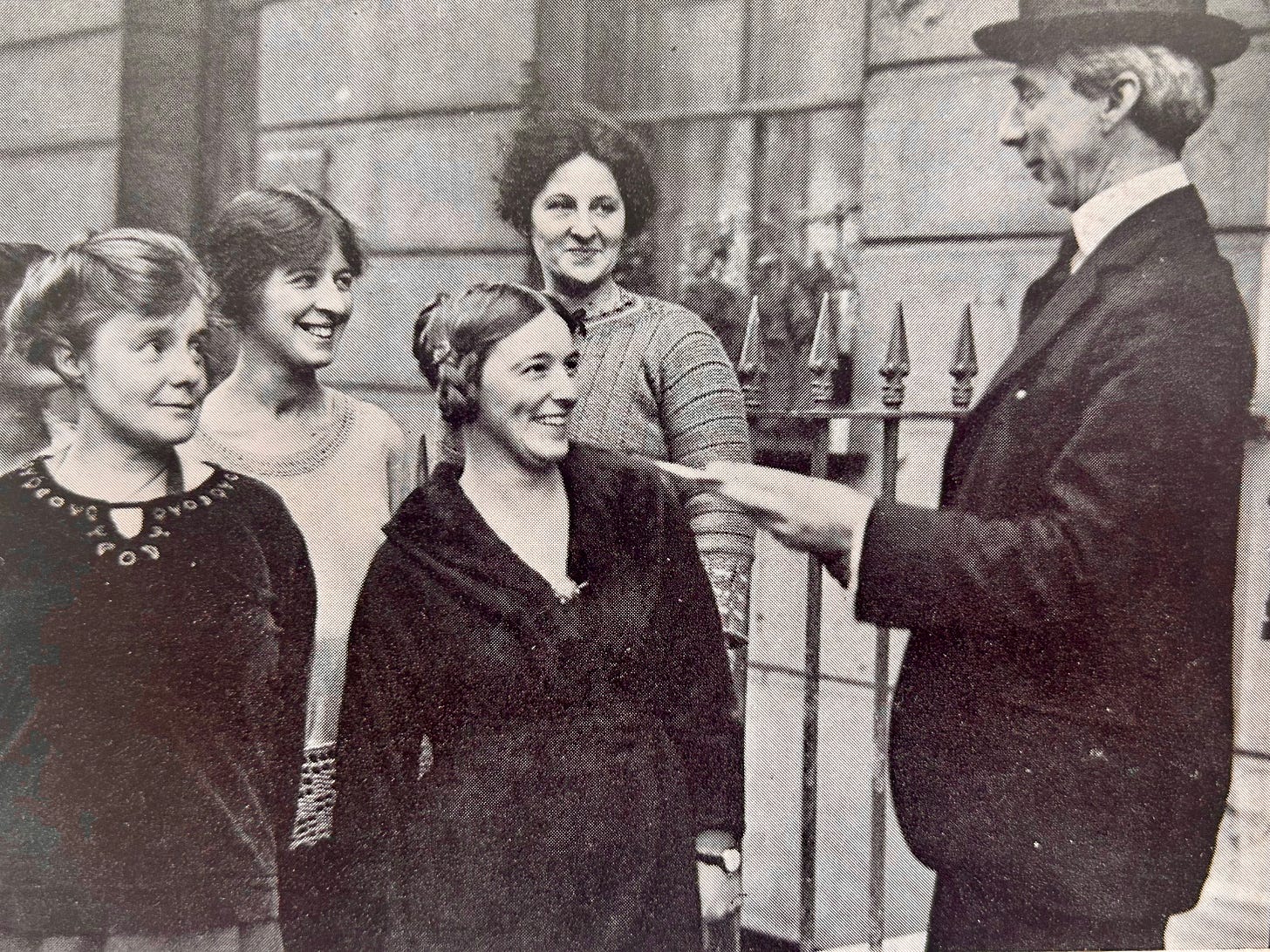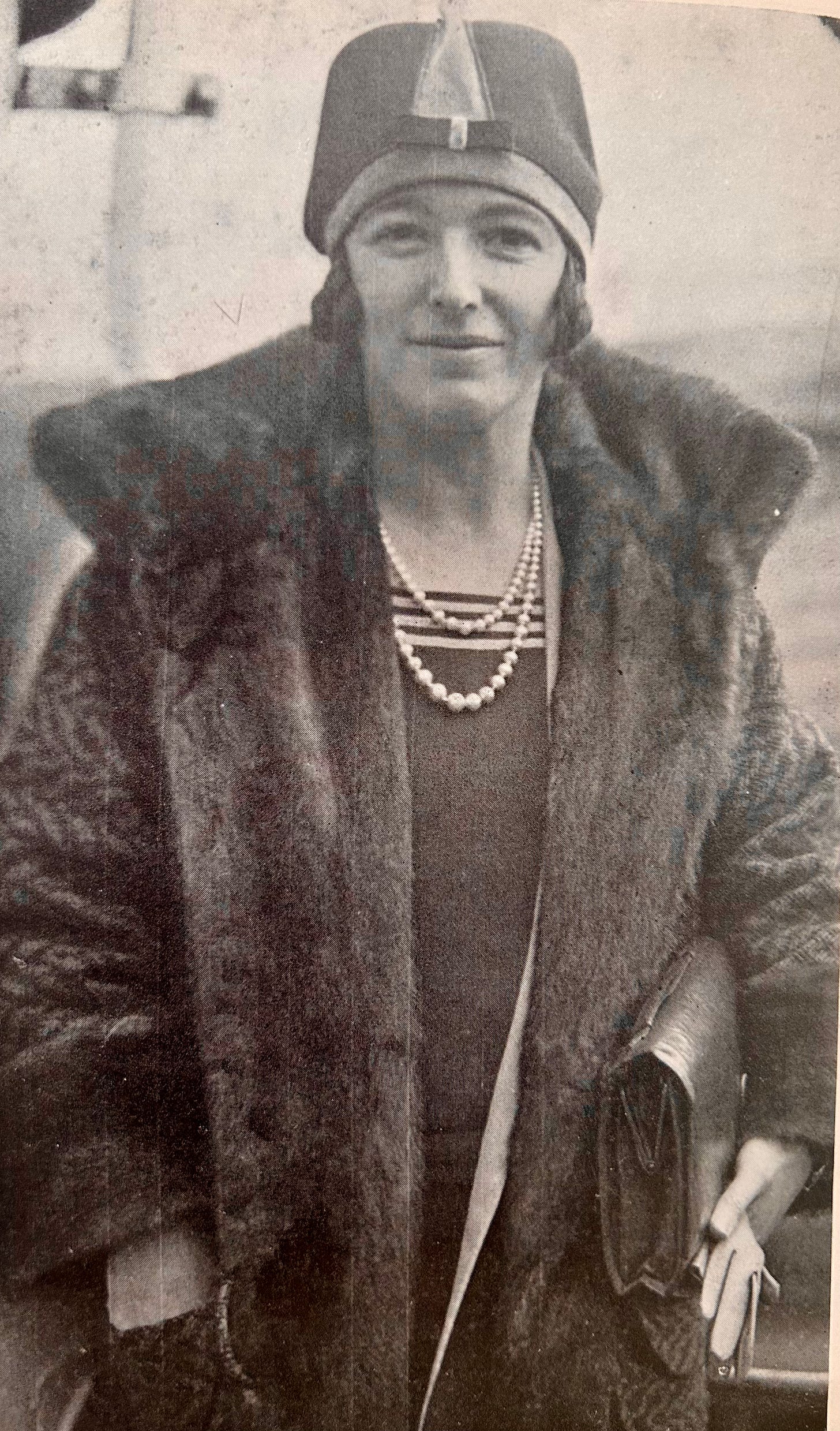Left to right (front) Stella Browne, Dora Russell, Bertrand Russell. 1923
It’s odd isn’t it that sometimes you can read two very different things within a very short time and have no idea beforehand how much they will resonate? The brain makes synergy from coincidence.
Consider the following two quotations:
“God knows I never saw anything in you except yourself; I wanted simply you, nothing of yours. I looked for no marriage bond, no marriage portion…. The name of wife may see more sacred or more binding, but sweeter for me will always be the word mistress…”
“Nobody could be more disappointed than I was over the marriage…. For my own part I felt it had no justification.. I shall certainly never quite recover from the feeling of disgrace I had in marrying…”
The first quotation is from a letter written about 1135 by Heloïse du Paraclet to her former lover, the philosopher and logician Peter Abelard. The second is a letter written in 1921 by Dora Russell (née Black) in respect of her recent marriage to the philosopher and mathematician Bertrand Russell.
The Abbess Heloïse du Paraclet and Dora Winifred Russell, Countess Russell, were extraordinary women whose lives have been defined by their relationship with two equally extraordinary men. Both women conceived a child out of wedlock, both reluctantly married their lover and both marriages ended badly.
Before the relationships that turned their lives upside down, Heloïse d’Argenteuil and Dora Black were already renowned for their intellect. They were clever girls in a man’s world. They were also practical, bold and courageous, and despite being born 800 years apart, they were two women who would have completely understood one another. Perfect companions at a fantasy dinner party.
A psychological study in 2016 discovered that for men to be attracted to clever women, the women have to be ‘compensatingly’ beautiful - which Dora and Heloïse both were. For clever women apparently it’s a man’s brain that counts. Dora herself said that Bertie Russell looked like a gnome. On the other hand we know that Peter Abelard was good looking as well as clever - he tells us so himself.
Without being prurient, what can we learn about someone from the circumstances in which they choose to shed themselves of their virginity? Dora Black gave hers to a Naval Captain she’d known for a few days, on the top deck of an ocean liner in the middle of the Atlantic, in the middle of a war. It was 1917. She was 23. “Life is for living” she said. How bold! How brave! It is also a further similarity to Heloïse who famously had sex with Peter Abelard in a corner of the refectory of the convent where she had taken refuge….
This is Dora ten years later on a subsequent voyage to New York.
Dora went up to Girton in 1912 after several months at a modest finishing school in Germany. She described Girton at the time as resembling a large girls boarding school where the students had to be ‘guarded with care’. By contrast with the stifling restriction on their day to day lives, Dora and her contemporaries were reading radical literature. Dora read ‘The New Machiavelli’ by H.G. Wells with its theme of sex and left wing politics, and Wells’s more autobiographical ‘Ann Veronica’ which had caused a scandal when it was published in 1909. The Spectator said ‘Ann Veronica’ would poison the minds of those who read it. (Mental segue here to the Lady Chatterley trial and Meryn Griffith-Jones asking the jury “Is this a book you would even wish your wife or your servants to read?’)
Here’s a quote from Ann Veronica.
She stood up and held her arms toward him. 'I want you to kiss me,” she said. . . . “I want you. I want you to be my lover. I want to give myself to you. I want to be whatever I can to you.” She paused for a moment. 'Is that plain?”
I can imagine that’s a version of what Dora might have said on the top deck of the SS Lapland. H. G. Wells based ‘Ann Veronica’ on the life of Amber Reeves with whom he had had an affair and a child. Part of the scandal caused by the book was that Ann Veronica’s sexually liberated behaviour did not end with her being reduced to prostitution, or dying tragically like the heroine of ‘East Lynne’. (Dead! Dead and never called me mother…) Ann Veronica’s story ends happily. She marries her lover, a man of a lower social class than herself. I can see why Edwardian Society would be outraged.
Amber Reeves also went to Cambridge - to Newnham College, where she achieved a double first in 1908, proving that sexually liberated conduct does not preclude getting a good degree. I wish someone had told my mother that when I matriculated nearly 70 years later.
The emancipation of women was part of the zeitgeist of Dora Russell’s time at Cambridge and she was of that generation who came to maturity immediately after the First World War. She was also (like Freya Stark) part of the two million so called ‘surplus women’ who had emancipation and independence thrust upon them, not always willingly.
However Dora was willing. She wanted to embrace, sometimes literally, every opportunity presented to her. After H.G. Wells, whom she came to know well later, another influence was the Cambridge Society known as ‘The Heretics’ which had been founded as a forum for radical debate in 1909. Through her membership of The Heretics Dora met the philosopher and mathematician Bertrand Russell on a walking tour organised by her friend Dot Wrinch. She describes him as a ‘mischievous sprite’ and ‘enchantingly ugly’ but like Heloïse before her, Dora saw a man ‘much in need of sympathy and affection’. Russell’s fame, his age and his reputation did not stand in the way of her feeling not just admiration but that she had something to give in return. I’m sure Heloïse felt the same.
Much of the rest of the first volume of autobiography that Dora wrote in her old age, deals with the rise and fall of her relationship with Bertie and I think that’s the subject for another post. What is of relevance here though is Dora’s passionate involvement in the campaign to make contraceptive advice available to all women, and birth control becoming a party political issue in the early 1920s.
I’m sure there are social historians who know more about this than I do, but it’s impossible to consider the campaign for contraceptive advice separately from issues of social class in the late 19th and early 20th century. To put it crudely; the upper classes had a vested interest in keeping the size of their class limited - less children more inherited wealth - and at the same time wanting the labouring classes to be fecund in order to provide for workers in factories and servants in houses.
Dora was at the forefront of trying to educate women of all classes in the workings of their own bodies and then helping them to realise that they should have autonomy over them. This was controversial enough, so heaven forbid that women should realise that they were allowed to enjoy sex! The majority of the population took the words of the marriage service as an absolute given. Women had sex simply in order to have children. ‘Lie there and think of England’ was not farfetched. Prostitutes might enjoy sex (so men thought) but nice women certainly didn’t and keeping their women ignorant was something that the majority of men thought was their right. The left wing campaigners for contraception for working class women also had to distance themselves from the eugenicists and Malthusians who believed contraception should be used to limit the numbers of those who were ‘of poorer stock’.
In 2023 the maternal mortality in the UK was 1.3 deaths per 10,000 women giving birth. In 1923 it was on average 45 per 10,000 (rising to 90 per 10,000 in industrial towns). Giving birth was four times more dangerous than working in a coal pit. This was the platform on which Dora campaigned. It was more dangerous to be a mother than a miner. To be fair, many people in the Labour movement found this statistic shocking but their response was not that births should be spaced out but that maternity facilities and wages should be improved. So Dora’s success was limited. Even the women’s sections of the Labour Party were less than enthusiastic and then there was the strong Catholic lobby within the party. In the end Dora says herself that the political point was lost in the face of a surge in the number women’s health clinics that were established by voluntary subscriptions.
Dora continued to be involved in family planning and women’s issues but ultimately her interest was in seeking a more humane and happier world where men and women work and raise children side by side. One person, she believed should never influence another’s right to do what they wanted to in order to achieve self fulfilment. It was a belief that would come back to haunt her.
This is Dora’s house at Porthcurno in West Cornwall. It’s now in the process of being restored by the Atlantic Peace Foundation.
https://atlanticpeace.org
Finally I must just say how much I love Stella Browne’s expression in the top photo. The wry scepticism of Russell that she displays contrasts with Dora’s enthrallment. Browne was a fascinating woman and still an undersung pioneer of freely available contraception and abortion. Dora said of Browne “She was a holy terror…I did glory in her intransigence”
Dora and Bertie had a cook called Hannah who came down to Cornwall with them every summer. She might have made this. Recipe and photo from my book ‘Cornish Feasts and Festivals’.
A Cornish Herb tart.
The hedgerows down here are white with album triquetrum at the moment. I used them chopped in this tart with wilted nettle tops, sorrel and wild fennel. Spinach, chives and parsley would do equally well.
Line a 22cm flan dish with shortcrust pastry and bake blind. Blitz 2 large eggs, 100ml full fat milk and 220g full fat cream cheese. Season well and grate over little nutmeg or powdered mace. Spread the herbs in the cooked flan case, put on a baking tray and add the cheese mixture. Bake for 25 mins at 190c for 25 minutes until puffed up and just set. Serve warm with a leafy salad.









Oh, I met Dora a couple of times when I was little! My parents knew her well because their best friend was her son Roddy. She came to our house for lunch and I remember both Roddy’s funeral and her own
Now I am thinking perhaps I should give up working on the three(?) books I have on what can hardly be described as the boil, and concentrate on Dora. I’d assumed that someone else had taken up the challenge, tbh, and indeed I thought I’d read that someone had. Or perhaps that was Harriet Martineau? Not that they have anything much in common other than my having had passing obsessions with them (and I suspect Dora would be a far more rewarding subject than Harriet, who became something of an old trout and wrote far too many unreadable books).